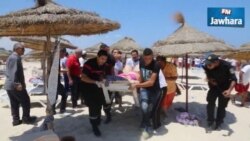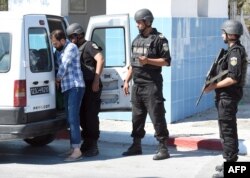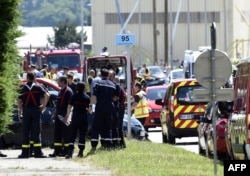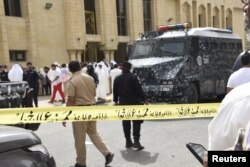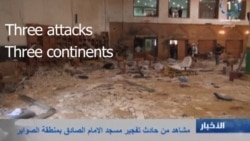Tunisian Prime Minister Habib Essid scrambled Saturday to boost security as thousands of foreign tourists fled the country, following a terrorist attack at a seaside resort.
Essid ordered army reservists deployed at hotels and other tourist sites, and he said some 80 mosques in the North African country known for radical preaching would be shut down.
At least 38 people were killed and dozens more were wounded Friday when a young Tunisian militant disguised as a tourist opened fire on a private beach and other facilities of the five-star Imperial Marhaba Hotel in Sousse. The beach, crowded Friday with European and regional tourists, was empty Saturday, blocked off by police tape.
Tunisia's health ministry said Saturday that it had identified the bodies of 17 people from Britain, Germany, Ireland, Belgium and Portugal. It was still trying to identify others shot dead in their beach attire.
The terrorist attack in Tunisia was one of three Friday.
More than 20 people were killed when a suicide bomber in Kuwait struck a crowded Shi'ite mosque as Muslims worshipped during the holy month of Ramadan. In southern France, a man stormed an American-owned chemical plant, decapitating one person and defacing the body with Arabic writings while trying to blow up the facility. A suspect is in custody.
In a statement Friday, the White House described the assaults as heinous. Other world leaders, including U.N. Secretary-General Ban Ki-moon and European heads of state, also condemned the attacks.
In a Twitter statement, Islamic State extremists took credit for the attack on the Tunisian resort and named the gunman as Abu Yahya al-Qayrawani. The Sunni group also claimed responsibility for the Kuwait mosque bombing.
U.S. officials said it was not clear whether all three attacks were planned and coordinated by the Syria- and Iraq-based extremists.
Christopher Chivvis, associate director of the International Security and Defense Policy Center at the RAND Corp., said it was important that the attacks were different in nature.
“For France, this shows that France is not only targeted by al-Qaida but also by Islamic State,” Chivvis said, referring to the Charlie Hebdo magazine attacks earlier this year that left 12 dead.
“The attacks in Tunisia are important because Tunisia is the final remaining linchpin of security in North Africa. It’s the only state that’s maintained a democracy after the Arab Spring," he said. "But the Islamic State clearly has it in its sights.
"And in the case of Kuwait, it’s obviously an important American ally in the region, so it should be a concern that it’s been targeted by the Islamic State."
Taking credit
Michael Pregent, adjunct lecturer on international security affairs at the National Defense University, said that while it would be a mistake to assume that all three attacks were coordinated by the Islamic State group, the group could easily claim credit.
“They’ve basically given license to anybody to claim affiliation with ISIS when they carry out a terrorist attack, even though there is no formal affiliation,” Pregent said, using one of the group’s acronyms.
“If you do anything in the name of ISIS, that’s good. ISIS doesn’t have to spend money on your operation, ISIS doesn’t have to coordinate it, ISIS doesn’t have to do anything, but they get credit for these things,” Pregent told VOA.
Many Islamic State experts had been expecting an Islamic State Ramadan offensive inside Iraq, possibly geared at fomenting a full sectarian war in the country.
Pregent said that because Iraqi forces and militias had ratcheted up their security for the holy month, the Islamic State group may have switched its focus to easier-to-hit soft targets abroad, such as the mosque in Kuwait.
Few strategic gains
Regardless of the horror factor of the three assaults, Pregent said the Islamic State group did not gain much strategically from the attacks.
He added that the violence did not compare with the 2005-06 Ramadan campaigns of its predecessor, al-Qaida in Iraq.
"It is not impressive compared to what al-Qaida was able to do. In 2005, you had 56 attacks a day in Baghdad, 56 attacks a day: car bombs, kidnappings, assassinations,” Pregent said.
Some material for this report came from AP, AFP and Reuters.
WATCH: Related video




